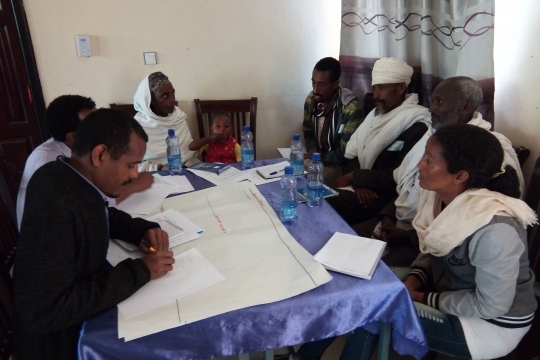The learning space for the Atsbi value chain took place on the 10-11 October 2018 at the Capital Hotel in Wukro, Tigray, Ethiopia hosted by the Environment and Climate Research Centre (ECRC) of the Ethiopian Development Research Institute (EDRI).
It is the second stakeholder engagement workshop in Ethiopia for Research and Learning for Sustainable Intensification of Smallholder Livestock Value Chains in Burkina Faso, Tanzania and Ethiopia (ResLeSS project)
The ReSLeSS project in Burkina Faso, Ethiopia and Tanzania, part of the SAIRLA programme funded by DfID, aims at creating a learning space where all decision makers in the value chain come together to learn about the tough choices that need to be made. From the farmer to the national policy level, passing through traders, experts and local government, all work together to develop a shared vision of what a good outcome for the livestock sector would be.
The learning was enabled with the Transformation Game, a game that lets participants select how many animals of each type they would like to have in the whole woreda in 2030. The types of animal included in the game are local breed dairy cows, fattening and rearing cattle, draft cattle, specialized dairy cows (cross-breeds) and sheep. Participants also select from two or three credible management options for each animal type. The resulting animal numbers and types from the game are entered into the CLEANED R tool, an environmental simulation tool that computes overall production, water use, greenhouse gas emissions and soil health from the specific choice of livestock numbers and management. Many different scenarios are run based on participants’ ideas. Advantages and disadvantages are discussed in mixed groups, allowing for a dialogue between farmers, traders, policy makers and experts. As discussions evolve, new scenarios are developed, simulated and evaluated on the spot until the group can find an agreement or compromise.
The visions developed by the mixed groups suggest that Atbsi should have fewer improved and well-fed cross-breed cows that produce more milk allowing to reduce greenhouse gases overall without compromising on the increased production. Particularly women are convinced that the increased milk production will empower them to have more decision-making power within their households.
